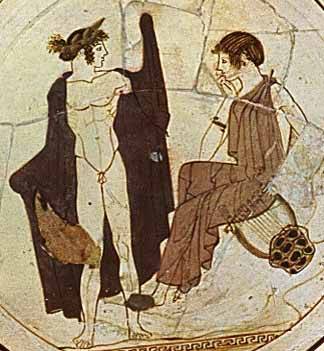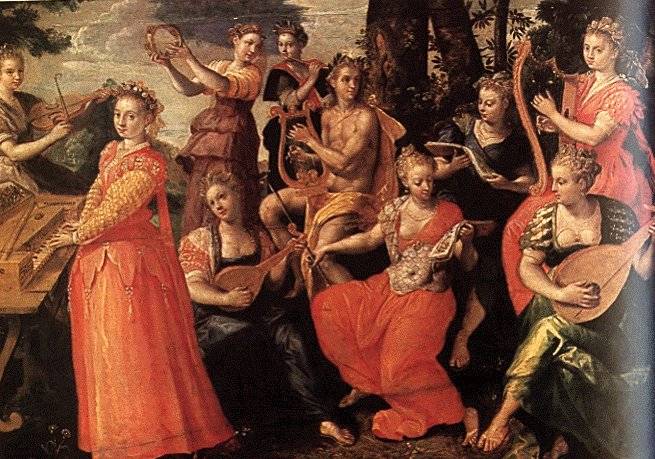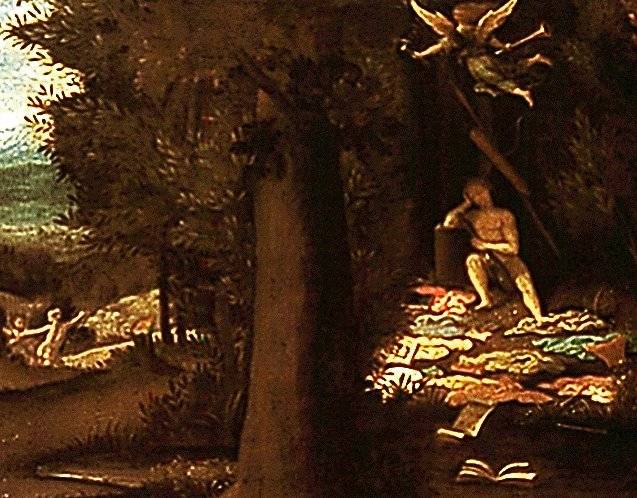|
|
|
The Cult of the Muses

It is the Muses
who have caused me
to be honored: they
taught me their craft
Sappho
tr. Barnard
.
From Thrace came the cult of the Muses which passed down into Hellas; and the half legendary founders of Greek music - Orpheus, Musaeus, and Thamyris - were Thracian singers and bards. The word mousike for the ancient Greeks meant originally any devotion to any Muse. For instance Plato's Academy was called Museion or Museam ( a place dedicated to the Muses and the numerous cultural pursuits which they patronized)The museam at Alexandria was a university of scientific and literary activity and not a collection of museam pieces like we may associate with the very word. Music to the Greeks was just as popular as it is for us today. Maybe more so.. In Arcadia all freemen studied music until they reached the age of thirty; everyone knew some instrument; and if one could not sing this was considered a great disgrace. Lyric poetry was name as such because in Greece, it was composed to be sung to the accompaniment of the harp, flute, or Lyre. Poets would write the music as well as the words and sang their own songs. To be a lyric poet in ancient Greece was by no means an easy task to take, it is by far more difficult than our standards today for a poet.
While our conversation is turned towards the Muses it is
only fitting to honor them by informing the readers a bit more about them and who they are... Zeus had mated with
the Titaness Mnemosyne ( Memory ), who gave birth to the Muses, the patronesses of literature, and the arts; thus
allegorically Memory with divine help produces inspiration. Homer often uses the phrases and I will remember so
and so and another song to, he most diffidently without dispute had often close contact with the Muses.
The Muses home is often located in Pieria in northern Thessaly near Mt. Olympus, or about the fountain of Hippocrene
on Mt.Helicon in Boetia.( the famous fountain of the Horse's spring, which gushed forth when the hoof of the winged
steed Pegasus struck the earth and leaped toward Heaven.) The Muses were Hesiod's neighbors so to speak. The Muses
name means "the reminders". They may have originally been water sprites with the powers of prophecy and
then inspiration. They are supreme in their areas of expertise and those whom dare to challenge them meet with
punishment and defeat. In this sense they resemble Apollo, whith who they are often associated with.The number
of Muses there actually are is not constant, but authors usually identify that there are nine, each with specific
functions, although assignments will be varied.

Calliope: presides over epic poetry,
Clio: history (or lyre playing),
Euterpe : lyre poetry (or tragedy and flute playing),
Melpomene : tragedy (or lyre playing),
Terpsichore: choral dancing (or flute playing),
Erato : love poetry (or hymns to the gods and lyre playing),
Polyhymnia: sacred music(or dancing),
Urania: astronomy, Thalia, comedy.
We present for your pleasure the Homeric Hymn to the Muses and Apollo (25)
With the Muses, let me begin, and with
Apollo and Zeus.
For, through the Muses and far-shooting Apollo, men on earth are poets and musicians; but through Zeus, they are
kings. Blessed are the ones whom the Muses love; sweet is the sound that flows from their lips. Hail, children
of Zeus, and give honor to my song; yet I shall remember you and another song too.

For those whom the Muses love :